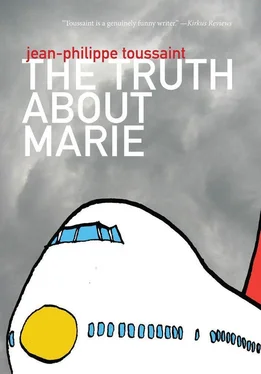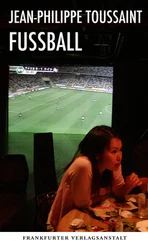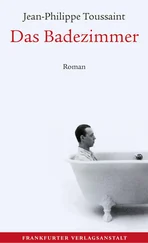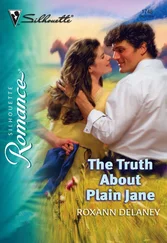Led by the pilot through the hold, among rows of boxes and containers, Jean-Christophe de G. and Marie reached the upper deck. They had followed a narrow floor-lit path, passed a section of five hundred vacuum-sealed office photocopiers arrayed in the half-light. The pilot then pulled down a straight telescoping ladder, opened a hatch, and invited them to come up. The plane’s upper deck was no more passenger-friendly than the main deck. There were only a few seats in this hollow space reserved for the loaders accompanying the merchandise. The floor was covered with a thin, worn carpet and behind the cockpit was a single row of seats, narrow, rudimentary. A Japanese man was already seated there, in sweat suit and socks, dozing in his seat, a sleep mask covering his eyes. Apart from this man and the pilots, they were alone in the plane. No sooner had they settled in their seats than the captain opened the door of the cockpit and asked Jean-Christophe de G. to travel with the thoroughbred in the hold, since they were about to depart, and it’s standard procedure when race- horses are transported for someone to be present to comfort the animals at the moment of takeoff.
Jean-Christophe de G. and Marie went back down to the hold. The lights had been dimmed for takeoff and, apart from the green lights of the emergency exits and the spectral blue lights lining the ceiling, darkness reigned in the depths of the plane. The Boeing 747 had begun on its way, had left its parking area and moved slowly in the night toward the runway in preparation for takeoff. A powerful wind rattled the fuselage and violent gusts shook the cargo at the back of the hold. The plane stopped at the beginning of the runway, awaiting authorization for takeoff from the control tower. Leaning forward, Marie looked out a small rain-struck window, its surface covered in a thin film of streaming water. She saw iridescent lights, white, yellow, sometimes red, steady or blinking, far off in the night, obstruction lights around the edges of the terminal and runway lights on the ground, blurring together with the airplane’s beaming headlights through which torrential rain continued to fall.
Jean-Christophe de G. unbolted the stall door and stepped inside with the horse. Zahir, motionless, head lowered, seemed calm in his stall, he was no longer blindfolded and the hemp rope that had been tied around his leg had been removed. He wore a short velvet rug on his back, and his pasterns were still somewhat protected by shoddy neoprene braces, stained with filth and mud, a multitude of brown splashes from the chase. Jean-Christophe de G. didn’t have time to examine the horse’s wound, for the captain made an announcement over the loudspeaker, brief, dry, hardly comprehensible in the crackling static of the speakers, and the plane began to move, started to gain speed on the runway, its whole body trembling, the stall door swinging wildly, which Marie tried to hold onto, all the cargo in the hold rattling in a clinking and straining of chains and straps, hooks, hoop irons, bungee cords, and clasps.
Jean-Christophe de G. held Zahir tightly by the bridle, his face planted flat against the horse’s neck, and he was talking to the horse in a soft voice to calm it. The horse, frightened by the growing thrust of the engines and their roar in the hold, fidgeted anxiously, shying and twisting its head. The plane continued to build speed and streaks of light filed by at increasing speed outside the exit door’s window, and when, with an irresistible push from the engines, the Boeing 747 cargo plane rose from the ground to take flight, Marie almost lost her balance, her surroundings blurring momentarily, and she had the sudden desire to race back up to her seat. She took a few steps in the dark toward the hatch, hesitant, wobbling, her arms extended for balance, but immediately she retraced her steps, realizing she’d never make it up alone. The plane was rocked violently in the air. It struggled to steady its ascent as it continued to gain altitude, tossed relentlessly by a hostile wind. It was passing through thick rain clouds, knocked around by the wind, and torrents of rain pounded the plane’s body. Thunder rumbled outside, and lightning flashed in the night outside the hold’s windows, its brightness reflected on the ceiling in streaks of terrifying white light, electric, zigzagging.
The atmospheric conditions eventually calmed and Marie was able to join Jean-Christophe de G. in the travel stall. The horse was calm, seeming defeated, as though under a strong sedative. Marie slid into the stall, crept along the side of the thoroughbred in the half-light. The travel stall was metallic, its space dark and narrow, damp under its elegant, quilted blue felt padding, and the floor, sturdy, rubbery, was partially covered with a bed of straw into which Marie’s feet sank as she walked. The plane continued to rise toward its cruising altitude. The turbulence hadn’t let up, and at times Jean-Christophe de G. put his hand against the stall wall to keep his balance while he examined the horse’s wound with a pocket flashlight. He had no veterinarian training properly speaking, but he’d had many an occasion in the past to take care of his own horses, dress a wound or administer a shot. Zahir’s knee was gashed, dead flesh and torn skin had curled away from the wound and begun to stiffen. Jean-Christophe de G. took out a handkerchief from his pocket and carefully cleaned the wound, removed some hairs stuck to the open gash, then, opening the first-aid kit the Japanese man had given him, he dug through its contents, tiny bottles, vials, creams, compresses, rolls of gauze, scissors. He took his glasses out of his jacket pocket and carefully put them on in the stall, it was the first time Marie had seen him wearing glasses (he’d avoided putting them on in front of her until this moment, as if waiting for the right time, and Marie was delighted to make this touching discovery in the hold of a plane), and he read the label of a bottle from Schein Inc. laboratories, Povidone topical solution, along with a long notice written in English in small type, which he skimmed through, holding the bottle right up to his eyes (yes, that’s it, iodine, perfect, he said, we can add a few drops of this to disinfect the wound).
Although of great simplicity the travel stall was not without its amenities, containing a large supply of fodder and hay, plenty of water, several five-liter containers. Jean-Christophe de G. filled a bowl from the spigot of one of the containers, and, crouching in the stall, had poured a few drops of saline solution into the bowl of water, to which he also added a touch of antiseptic, until the mix, which he stirred lightly with his fingertips, reached the light color of oolong tea, with a few darker streaks, the color of licorice, like curvy veins, sinuous lines floating on the water’s surface. He stood up carefully, rocked by the plane’s unsteady course, and he walked toward the horse on trembling legs, trying to hold the bowl steady as the water rolled and lapped, spilling over the bowl’s sides and onto the hay in tiny splashes. Jean-Christophe de G. held the bowl to his chest cautiously, protecting it from any further jerks or jolts, and he began dressing the wound, dabbing the dead skin with a damp compress, removing the scum stuck around the wound, pebbles, dirt, and other foreign bodies encrusted on the damaged skin tissue. The horse, staring blankly, looked numb, serene. Only once did it step back with force, abruptly, as though to demonstrate it could still be dangerous.
The plane encountered more turbulence. It started to rock and shake even more than before, the plastic containers clattered on the ground, straps swung uncontrollably from the stall wall, the first-aid kit tipped over and spilled out its contents on the floor, vials upturned, small scissors in the hay. The situation was becoming critical in the stall, Marie was forced to hold onto the edge of the trough lest she be tossed down at the horse’s feet, and, from the plane’s loudspeakers, distant, crackly snippets of pressing emergency announcements could be heard, of which they understood nothing, simply guessing they’d been instructed to return to their seats and fasten their safety belts. All the lights suddenly turned on simultaneously from the hold’s ceiling, throwing the premises into sharp, violent relief, casting a harsh light onto the stacks of pallets visible through the stall’s open door, and then the neon lights flickered on the ceiling before going out, not a single light remained, even the emergency exit lights had gone off. Alert, the horse became frantic in its stall, sensing the growing anxiety in the plane, stomping in place, stepping back, yanking its lead in every which way, tugging on the trough it was attached to. The horse wanted to turn around, and it reared up in the stall, stood on its hind legs, and began neighing, its long mouth open, suddenly baring its teeth and gums in the dark. Marie thought it had managed to get free and, frightened, she bolted out of the stall.
Читать дальше












